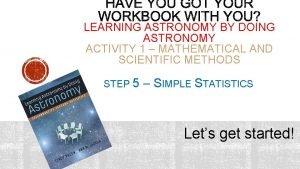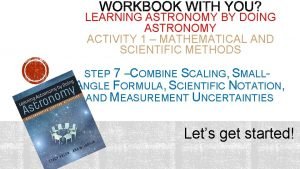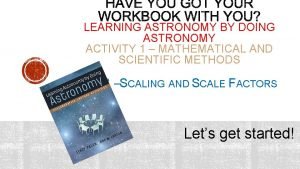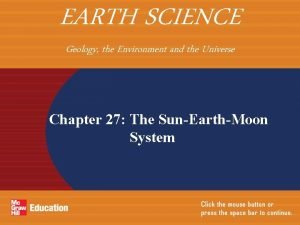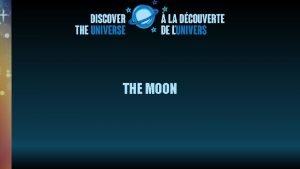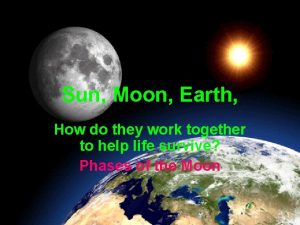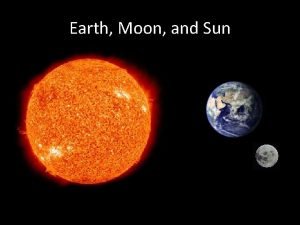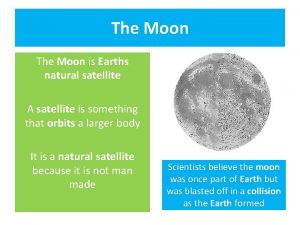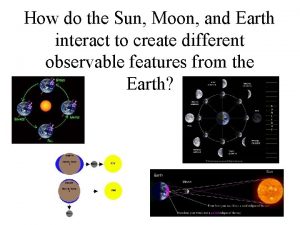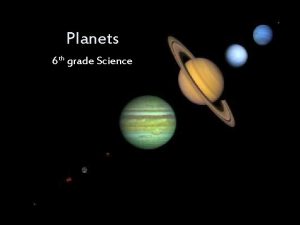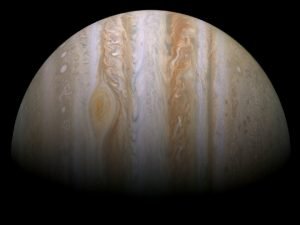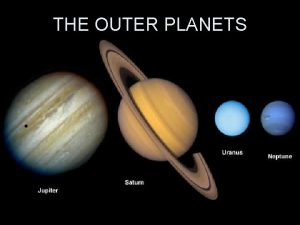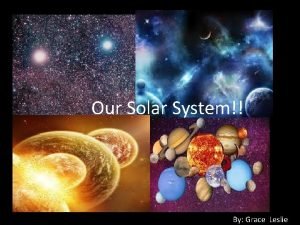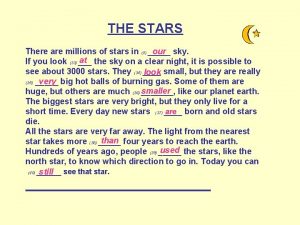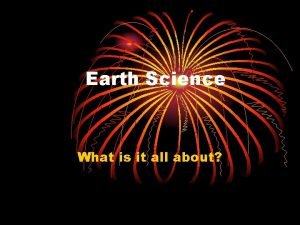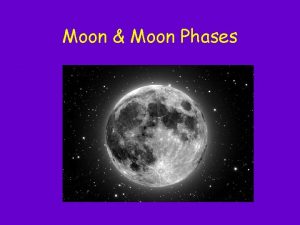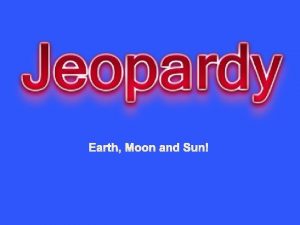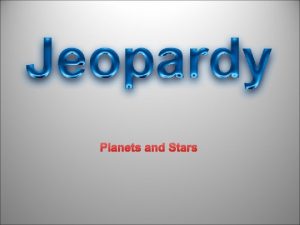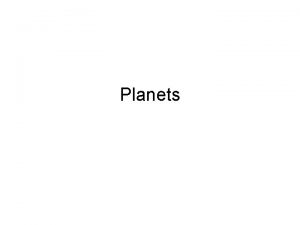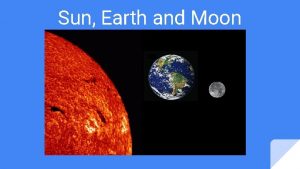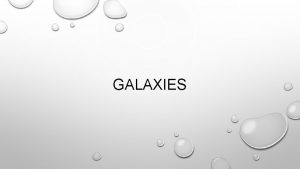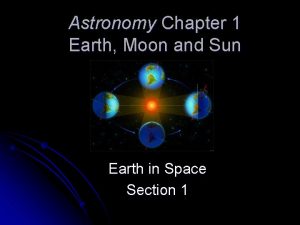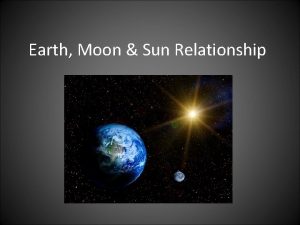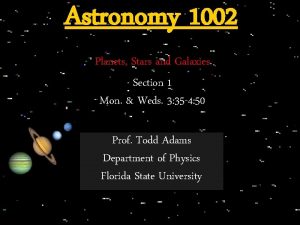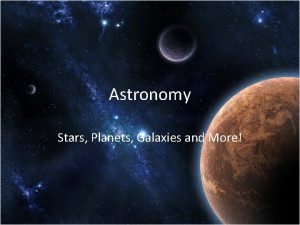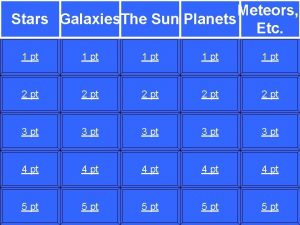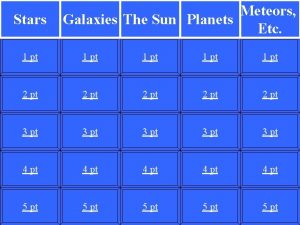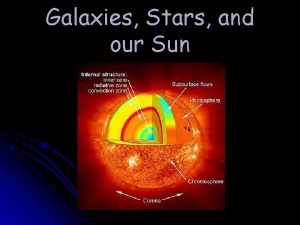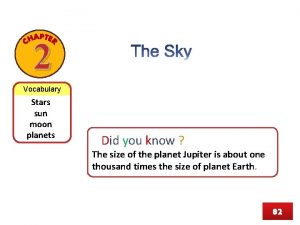Astronomy Earth Sun Moon Stars Planets Galaxies Astronomystudy





















- Slides: 21

Astronomy Earth, Sun, Moon, Stars, Planets & Galaxies

Astronomy=study of stars, planets, and space • Several theories about how the Universe started: Constant State Theory: the universe has always existed and just expands Oscillating Model Theory: the universe is always contracting and expanding Big Bang Theory: the universe began around 13. 8 billion years ago from a single point and started expanding

Formation of the Solar System: Big Bang 1. Began 4. 6 billion years ago as a nebula (floating cloud of gas, ice, dust) 2. Shockwave caused nebula to rotate, condense and flatten into disc shape 3. Gravity pulled particles into clumps of matter and sun was born from fusion

Historical Theories of Solar System Geocentric Model (Aristotle, Ptolemy) Earth is the center of the solar system, everything revolves around Earth

Historical Theories of Solar System Heliocentric Model (Copernicus, Galileo Galilei) The Sun is the center of the solar system, everything revolves around Sun

Earth -Not a perfect sphere, slightly squished into elliptical shaped due to rotation -Earth’s movement and iron core give it a magnetic field “magnetic north” is always moving and not “north pole”

Earth ROTATION: Earth spinning around its center axis 1 rotation= 24 hours (1 day) REVOLUTION: Earth’s circular movement around the sun 1 revolution = 365 days (1 year) Path around sun is called ORBIT

Earth is tilted 23. 5 degrees from perpendicular orbit

Earth Night/Day are created by the Earth’s rotation

Earth Seasons are created due to the Earth’s tilt The tilt creates warmer or cold climate depending on if the location is closer or further from the sun at a certain time Seasons are always opposite in northern and southern hemisphere

Earth Solstice Days that earth is most tilted towards the sun Longest and shortest days of the year (first day of summer/winter) Equinox Equator is directly under sun Days are the same length all over world (first day of spring/fall)


Brain. Break • Astronaut Chris Hadfield

Moon • Moon: any object that revolves around a planet, natural satellite • Mountains, craters, smooth regions, dark regions

Moon 1 ROTATION: 27 days 1 REVOLUTION around earth = 27 days counterclockwise Because the moon rotates and revolves at the same speed we always see the SAME face of the moon (DARK SIDE OF MOON)

Moon “Phases”: amount of sunlight reflected and position of moon vs. earth WAXING: growing in appearance WANING: shrinking in appearance LUNAR Cycle: about 30 days to complete all 8 phases

8 Moon Phases Activity • Full Moon • Waxing Gibbous • New Moon • Waning Gibbous • First Quarter • Waning Crescent • Waxing Crescent • Third Quarter

Moon

Moon • Lunar Eclipse: earth is between moon and sun, moon glows red • Solar Eclipse: moon is between earth and sun, moon casts complete shadow on earth

Moon • Moon’s gravity pulls on Earth causing tides (rise or fall in ocean water levels) • Sun, Moon, Earth lined up creates Spring Tide which is larger tide • Sun, Moon and Earth not lined up creates Neap Tides

Sun • Medium, main sequence, yellow dwarf star (uncommon single star) • Atmosphere (green) • Convective Zone (yellow) • Radiative Zone (orange) • Core (red)
 Waves produced by stars and galaxies
Waves produced by stars and galaxies Learning astronomy by doing astronomy
Learning astronomy by doing astronomy Learning astronomy by doing astronomy answers
Learning astronomy by doing astronomy answers Learning astronomy by doing astronomy
Learning astronomy by doing astronomy Earth moon
Earth moon Andreu cardo martinez
Andreu cardo martinez Sun moon earth relationship
Sun moon earth relationship How does the sun moon and earth work together
How does the sun moon and earth work together How does the earth sun and moon work together
How does the earth sun and moon work together Sun earth
Sun earth The sun-earth-moon system worksheet answers lesson 1
The sun-earth-moon system worksheet answers lesson 1 New moon position of sun and earth
New moon position of sun and earth How do the sun moon and earth interact
How do the sun moon and earth interact Inner terrestrial planets
Inner terrestrial planets Are jovian planets more dense
Are jovian planets more dense What are the outer planets mostly made of
What are the outer planets mostly made of The inner solar system by leslie
The inner solar system by leslie What separates the inner and outer planets?
What separates the inner and outer planets? There are millions of stars in space
There are millions of stars in space Astronomy definition earth science
Astronomy definition earth science Home.hiwaay.net/ krcool/astro/moon/moon tides/
Home.hiwaay.net/ krcool/astro/moon/moon tides/ The science duo
The science duo

